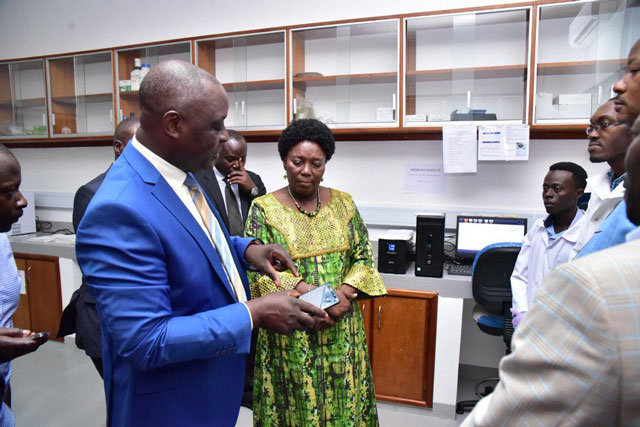
MPs under pressure
If parliament takes that path to pass the Genetic Engineering Regulatory Bill, 2018 without Museveni’s consent, it will be unprecedented. It will also be a sign of the pressure the MPs must be feeling over the Bill.
Local scientists say Uganda’s agricultural sector is grappling with challenges of climate change and pests and diseases which require innovative solutions, including the latest advancement in science.
Over the last 20 years, Uganda has been promoting the adoption of genetically modified (GM) crop varieties with several confined field trials being conducted in Uganda’s agricultural research stations. The researchers occasionally share the results with local farmers.
On July.30, Jude Aleu, a crop scientist, harvested two cassava tubers from a patch at the National Agricultural Crop Resources Institute, Namulonge. One tuber was genetically modified and the other was not.
On tour of the research institute 25km north of Kampala were small scale farmers from the central district of Nakasongola.
“You see these two tubers?” Aleu told the farmers. “One is from this stem, which is genetically modified and this other one is non-genetically modified.”
Aleu then proceeded to chop the two tubers, beginning with the genetically modified cassava, whose inside showed no contamination. When he chopped the other tuber which is non-GMO, it was all rotten. The tubers were harvested from the same field.
“The root is all rotten and the farmer can get zero harvest from the entire farm. This is what a section of our farmers are reaping,” Aleu told the now attentive farmers.
Aleu told the farmers that the cassava that did not show any sign of the disease in the garden was because it had undergone some kind of ‘immunization,” similar to the one given to young children against measles or tuberculosis.
His usage of the word ‘immunization’ was to help the farmers understand the new technology –biotechnology engineering – which is now being used to develop crops that are resistant to pests, diseases as well as drought.
In terms of weight, Aleu said biotech cassava produced an average of 14-22kg per stem compared with less than 1-2kg per non-biotech cassava stem. Cassava is one of the most important crops in Uganda but it is being wiped out by the cassava mosaic disease and the cassava brown streak disease.
After witnessing the two types of cassava grown on the confined farm, Sam Kigula, one of the Nakasongola farmers said such biotech crops should be already with the farmers to help them deal with the issue of pests, disease and drought.
But Titus Alicai, the head of cassava research at the institute said although research is now about 80% complete and this type of cassava could be ready for release to the farmers in the next two years, that will not be the case until all the relevant legislation is passed by Parliament.
Similar research is ongoing in other agricultural research stations. For instance, genetically modified (GM) bananas are being tested for resistance to banana bacterial wilt and black sigatoka as well as bio-fortification of bananas with micronutrients such as iron and Vitamin A at the National Agricultural Research Laboratories, Kawanda.
Proponents of biotechnology in agriculture argue that GM crops can potentially improve yields and livelihoods and transform the agriculture sector, and therefore alleviate food shortage and boost economic development.
Local scientists say the application of science, technology and innovation will be a game-changer and the answer to Uganda’s rapidly growing population which is now estimated at around 40 million and projected to hit the 80 million mark by 2050.
Prof. Joseph Obua, the chairman Governing Council at the National Agricultural Research Organisation (NARO) noted in November, last year, that the critical challenges to agriculture such as climate change and devastating pests and diseases are quite formidable and require innovative solutions, including the latest progress in science to meet increasing demand for food, feed and income. But even with some positive results taking place in several agricultural research stations around the country, not everybody is convinced.
Those against GMOs say use of genetically modified by-products in agriculture could block farmers from saving seed from their harvest for replanting the following season because seeds are patented.
 The Independent Uganda: You get the Truth we Pay the Price
The Independent Uganda: You get the Truth we Pay the Price


